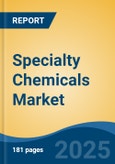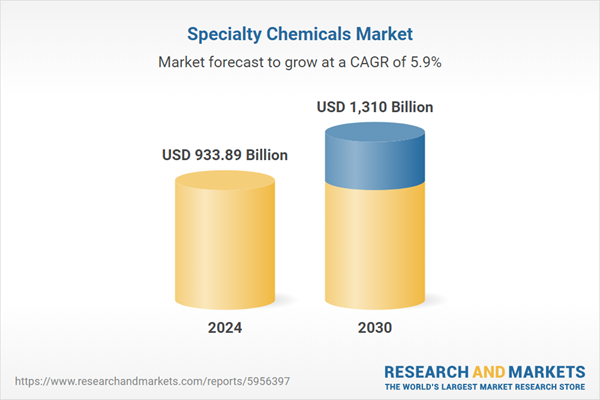Agrochemicals is the fastest growing segment, Asia-Pacific is the largest regional market
Speak directly to the analyst to clarify any post sales queries you may have.
10% Free customizationThis report comes with 10% free customization, enabling you to add data that meets your specific business needs.
Key Market Drivers
The global specialty chemicals market is significantly propelled by the rising demand across diverse end-use industries, necessitating tailored chemical solutions for enhanced product performance and functionality. Sectors such as electronics, automotive, construction, and personal care consistently seek specialized ingredients to meet evolving technological advancements and consumer expectations. For instance, the escalating production of advanced electronic components drives demand for ultra-high purity chemicals.Key Market Challenges
The inherent volatility of raw material prices presents a significant challenge directly hampering the growth of the Global Specialty Chemicals Market. Fluctuations in the cost of essential feedstocks and energy inputs directly elevate production expenses for manufacturers. This unpredictability complicates financial planning and inventory management, often leading to reduced capital expenditure and constrained operational flexibility for specialty chemical producers.Key Market Trends
Increased Digitalization and AI Adoption is profoundly transforming the global specialty chemicals market by significantly enhancing operational efficiencies and accelerating innovation. The strategic adoption of advanced digital tools, including Artificial Intelligence, machine learning, and data analytics, enables predictive maintenance, optimizes complex research and development processes, and streamlines supply chains. This integration directly reduces operational costs and expedites product commercialization.According to CAS, in September 2023, two-thirds of companies reported actively developing AI strategies to address sustainability goals. A notable instance is BASF's achievement, reported in September 2025, where an AI system reduced chemical research timelines from eighteen months to just three weeks by leveraging extensive historical chemical knowledge for predictive intelligence. This advancement is vital for maintaining competitive advantage and responding swiftly to market demands.
Key Market Players Profiled:
- Evonik Industries AG
- Dow Chemical Company
- Arkema Group
- Lyondellbasell Industries NV
- BASF SE
- Wacker chemie AG
- Albemarle Corporation
- Saudi Arabian Oil Co.
- Sumitomo Sieka Chemicals Co Ltd
- Anhui Newman Fine Chemicals Co., Ltd.
- Ashland Inc
- Maxwell Additives Private Limited
- Kemira Oyj
- Lanxess AG
- Covestro AG
- Huntsman Corporation
- Solvay SA
- Clariant AG
- The Lubrizol Corporation
- Croda international Plc
Report Scope:
In this report, the Global Specialty Chemicals Market has been segmented into the following categories:By Type:
- Agrochemicals
- Construction Chemicals
- Electronic Chemicals
- Water Treatment Chemicals
- Plastic Additives
- Rubber Additives
- Textile Chemicals
- Cosmetic Ingredients
- Pharmaceuticals & Nutraceuticals Additives
- Adhesives
- Specialty Oilfield Chemicals
- Others
By Region:
- North America
- Europe
- Asia-Pacific
- South America
- Middle East & Africa
Competitive Landscape
Company Profiles: Detailed analysis of the major companies present in the Global Specialty Chemicals Market.Available Customizations:
With the given market data, the publisher offers customizations according to a company's specific needs. The following customization options are available for the report.Company Information
- Detailed analysis and profiling of additional market players (up to five).
This product will be delivered within 1-3 business days.
Table of Contents
Companies Mentioned
The companies profiled in this Specialty Chemicals market report include:- Evonik Industries AG
- Dow Chemical Company
- Arkema Group
- Lyondellbasell Industries NV
- BASF SE
- Wacker chemie AG
- Albemarle Corporation
- Saudi Arabian Oil Co.
- Sumitomo Sieka Chemicals Co Ltd
- Anhui Newman Fine Chemicals Co., Ltd.
- Ashland Inc
- Maxwell Additives Private Limited
- Kemira Oyj
- Lanxess AG
- Covestro AG
- Huntsman Corporation
- Solvay SA
- Clariant AG
- The Lubrizol Corporation
- Croda international Plc
Table Information
| Report Attribute | Details |
|---|---|
| No. of Pages | 181 |
| Published | November 2025 |
| Forecast Period | 2024 - 2030 |
| Estimated Market Value ( USD | $ 933.89 Billion |
| Forecasted Market Value ( USD | $ 1310 Billion |
| Compound Annual Growth Rate | 5.8% |
| Regions Covered | Global |
| No. of Companies Mentioned | 21 |









